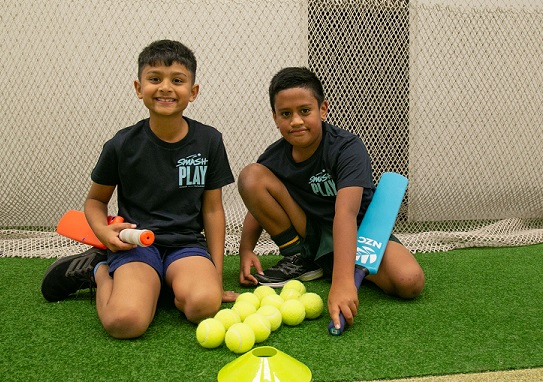Teacher and Kaiako Introduction
What is Smash Play junior-tamariki?
Smash Play junior-tamariki is a programme consisting of a wide variety of games. It’s a non-linear programme, teachers and kaiako can select from the games to build a session. There are games to cater for all abilities, various group sizes or can be played at home. Smash Play isn’t just physical activity, it has an emphasis on:
• Play ‘continue to evolve’
• Learning and exploration ‘fun’
• Individuality ‘for everyone’
• Values and culture ‘building better people’
Each game is values-based, an approach that focuses on enhancing personal and social responsibility. This approach is based on the internationally utilised Hellison’s TPSR model.
Why are we getting our children to do this?
We are focused on providing quality experiences for all young people. With a focus on game play, and values, our aim is for cricket to provide enjoyment, alongside the social and personal development playing sport with friends brings. We know children learn through game play. They develop skills, develop a love for an active and healthy lifestyle and enjoy being with friends and whānau.
The games also develop functional movement, with cricket specific outcomes. Getting children more active and developing skills with a cricket focus.

New Zealand Curriculum – Key Competencies
Smash Play junior-tamariki has been designed to ensure it is relevant to teachers and kaiako and can be used in schools and kura. This has been achieved through aligning Smash Play junior-tamariki to the five key competencies within the New Zealand Curriculum.
Thinking
Smash Play junior-tamariki has an emphasis on learning and exploration. Children will learn through playing, and using creative, critical, and cognitive processes to make sense of information, experiences, and ideas. Children can apply these creative, critical and cognitive processes to:
• Develop an understanding of Smash Play junior-tamariki games and the key skills focus for each game
• Help with decision making and shaping actions when playing the games
• To build knowledge of their movement during their involvement which can be used in the future
Using language, symbols, and texts
Smash Play junior-tamariki has been designed specifically for junior involvement. Games are explained through words, numbers, images and movement to help children understand the environment they are in and the skills they will be developing.
Teachers and Kaiako are encouraged to ask children questions rather than give instructions. Questioning will provide children with a platform to self-explore and connect with the language being used, rather than having decisions made for them through the delivery of instructions.
Managing Self
Smash Play junior-tamariki has an emphasis on individuality, making sure it is for everyone. This, along with the underlying emphasis on fun, helps to create a positive and motivating environment. Children can manage themselves through games by:
• accepting a mission within the game
• challenging the coach/activator in a boss battle
• adjusting their play during the game to fit within a changing area
Children can also set goals of working through the regression and progression elements of the games as they develop an understanding of their skills.
Relating to others
A values piece has been created as part of the Smash Play junior-tamariki programme to ensure there is an emphasis on values and culture, ‘building better Kiwis’, and to create the right environment for our children. Three key values were identified: support - tautoko, cooperation – mahi tahi and honesty - pono. These values will help children to interact effectively with others by:
• Support - tautoko – being aware of how their words and actions affect others
• Cooperation - mahi tahi – developing the ability to listen actively, recognize different points of view, negotiate and share ideas
• Honesty - pono – being able to relate to each other through trust and openness
By interacting effectively together, children can come up with new approaches, ideas, and ways of thinking.
Participating and contributing
Smash Play junior-tamariki has an emphasis on play and to continue to evolve. This provides our children with the opportunity to be actively involved in the shared interest of play and learning. Children who contribute to a common interest, such as play and learning, can develop a sense of belonging and the confidence to participate within new contexts. Within this environment children will make connections with others and create opportunities for others in the group. Participation in Smash Play junior-tamariki may lead to longer-term involvement in cricket or sport in general, helping our children to remain active in the future.

Values based approach
As mentioned earlier in this resource, Smash Play junior-tamariki has been based around a values model approach, picking out three key values that underpin the programme. These being support – tautoko, cooperation – mahi tahi and honesty – pono. Teachers and kaiako can introduce any school specific values, in addition to these three values, that may be relevant and known by the children. This approach will further help embed the values model approach Smash Play junior-tamariki is based on.
To help children with applying these values into their Smash Play junior-tamariki play, and also into their wider everyday lives, we need to help them focus on what they need to take responsibility for. Hellison’s TPSR model, specifically the components of the levels of responsibility, provides good guidance for this. Despite referring to ‘levels’ of responsibility, progression won’t always be in a linear fashion. The levels provide specific steps to keep in mind when working with children.
See below:
• An appropriate starting point can be to work on self-control, peaceful conflict resolution and involvement in cooperative peers. This will help to develop respect towards the rights and feelings of others.
• Focusing on self-motivation, exploration and working with others will develop effort and cooperation.
• Looking at accountability through on-task independence, goal-setting progression and having the courage to resist peer pressure will develop self-direction.
• Caring and compassion, sensitivity and responsiveness and inner strength are key elements in understanding how to help others and building leadership.
• Finally, applying the above in other areas of life, outside of Smash Play and cricket, and being a positive role model will lead to transferring these skills to wider aspects of life












